
A Spanish nurse has contracted Ebola after treating two patients who died from the disease at a Madrid hospital, the government said Monday, in the first known case of transmission outside of Africa.
The 40-year-old began to feel ill on September 30 but did not go to hospital until Sunday, complaining of a fever.
Two tests have now confirmed that she has been infected with the deadly virus that has killed more than 3,400 people in west Africa.
Spanish health officials are scrambling to find out who she may have come into contact with, and are monitoring 30 people — including her co-workers and husband — closely for symptoms of the deadly disease.
The woman was part of a medical team at Madrid’s La Paz-Carlos III hospital that treated two elderly Spanish missionaries who died of Ebola shortly after they were repatriated from Africa.
She had gone on holiday the day after the second patient died on September 25, Madrid’s primary healthcare director, Antonio Alemany, said at a news conference, without specifying where she had travelled to.
The nurse, who is married without children, is now being treated in isolation at a hospital in Alcorcon, a southern Madrid suburb.
She is in a stable condition although still running a fever, Alemany added.
– Repatriation deemed risky –
News of the nurse’s infection has sparked renewed questions about the Spanish government’s decision to repatriate infected missionaries from Africa, with critics saying that the nation’s hospitals were not adequately equipped to deal with Ebola cases.
The nurse had treated Spanish priest Miguel Pajares, 75, who was infected with Ebola in Liberia and died on August 12, as well as Manuel Garcia Viejo, 69, who was repatriated from Sierra Leone and died on September 25.
Pajares was the first patient in the fast-spreading Ebola outbreak to be evacuated to Europe for treatment.
Both missionaries were treated in isolation at La Paz-Carlos III hospital, and the medical team that cared for them were closely monitored.
But a union that represents Spanish doctors, Amyts, had called the repatriation “risky”.
“We are working to see if all the protocols which were established were strictly followed,” Health Minister Ana Mato told the news conference.
“Spain follows all the recommendations of the World Health Organization,” she added.
The Ebola virus causes fever, muscle pain, vomiting, diarrhoea and sometimes internal and external bleeding.
It spreads through contact with the bodily fluids of someone who has the virus, and the only way to stop an outbreak is to isolate those who are infected.
There is no market-approved drug for treating Ebola yet, and no vaccine to prevent it.
Of several prototype treatments in the pipeline, one dubbed ZMapp has been fast-tracked for use, developed by Mapp Biopharmaceutical in California in conjunction with the US Army.
Ebola has caused 3,439 deaths out of 7,478 cases across five west African nations — Liberia, Guinea, Sierra Leone, Nigeria and Senegal, according to the latest tally from the World Health Organisation.
Europe and the United States have also been touched by the disease, but until now all the cases stemmed from people who caught the virus in west Africa.
– ‘Extraordinarily low’ chance of US outbreak –
Seeking to allay fears about contagion in the United States, President Barack Obama said the chances of an outbreak in his country were “extraordinarily low”.
He vowed however to press world leaders to step up the global fight against the deadly epidemic in west Africa.
US health officials said a Liberian man diagnosed with Ebola in Texas had received an experimental drug called brincidofovir, the first time the medicine has been used to fight the virus.
The man’s condition worsened from serious to critical over the weekend.
Also on Monday, the charity Doctors Without Borders (MSF) announced that a Norwegian employee had contracted Ebola in Sierra Leone and would be repatriated shortly.
Another MSF worker, a French nurse, caught the virus while volunteering in neighbouring Liberia but has been cured, according to the French government.
French President Francois Hollande said before the Spanish case was revealed that France was ready to deal with any outbreak of Ebola on its soil.
“We would be capable of providing treatment if any cases occur in France,” he said.
Source: BCNN 1